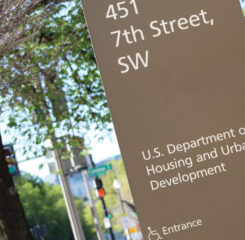Throughout 2024, LeadingAge members raised concerns about supplemental benefits being offered in the form of “flex cards” to beneficiaries by Medicare Advantage (MA) and Special Needs Plans (SNPs). From deceptive and aggressive marketing practices to confusion about whether any, or all, of these flex card benefit offerings must be counted as income or assets when determining someone’s eligibility for various government assistance programs, members’ questions provided the foundation for LeadingAge advocacy.
Over the past 12 months, LeadingAge reached out to various agencies, including the Centers for Medicare and Medicaid (CMS) and the U.S. Department of Housing and Urban Development (HUD), as well as to Congress. Via dissemination of issue briefs and examples of the impact and confusion created by the lack of clarity on how to treat these supplemental benefits, as well as through coalition work with other associations, we elevated our concerns and proposed solutions.
More than 30 members of Congress also shared their concerns on the topic: in an October 2024 letter, they urged the President to “direct federal agencies to issue guidance clarifying that Medicare Advantage Flex Cards shall not be deemed as countable income or assets for the purposes of calculating eligibility for federal assistance and benefits allowance.” Reporters took interest as well: flex cards being counted as income in some instances can “create double trouble for low-income older adults,” our Vice President of policy and government affairs Mollie Gurian explained to Axios.
Possible solutions we’ve recommended included: requiring brokers and agents to notify beneficiaries that enrolling in an MA plan with flex card benefits could jeopardize their eligibility for certain government assistance, requiring confirmation of intent when a beneficiary disenrolls from a Program of All Inclusive Care for the Elderly (PACE) program into an MA-only plan, and suggesting these flexible benefit cards be excluded from counting as income or assets when determining eligibility for government programs, such as federal housing subsidies, Medicaid, Supplemental Security Income, and programs like Supplemental Nutrition Assistance Program (SNAP).
Following our advocacy, staff at CMS, HUD, and the United States Department of Agriculture (USDA) clarified their positions.
HOUSING AND URBAN DEVELOPMENT (HUD) PROGRAMS
HUD issued frequently asked questions (FAQs) on January 15, 2025 that essentially instruct housing providers to include amounts used to pay for rent and utilities in the income calculation, while all other benefits should be excluded. According to HUD, MA benefits administered through flex cards should be excluded from income without additional documentation unless available information indicates that the beneficiary is using the benefit for rent and utilities.
CENTERS FOR MEDICARE AND MEDICAID (CMS) PROGRAMS
CMS did not issue sub-regulatory guidance on the matter but did clarify their position in a letter to members of the U.S. House of Representatives on January 8, 2025. CMS’ letter suggests that the flex benefit cards should not factor into eligibility determinations for assistance or benefits but is not explicit in saying that, as we explain here. CMS’s position is that these cards are plan benefits, must be approved by CMS and as such, must be tied to maintaining or improving an individual’s health.
SUPPLEMENTAL NUTRITION ASSISTANCE PROGRAM (SNAP)
The USDA is the only agency that has explicitly instructed state agencies to exclude MA supplemental benefits from the income calculation for the purposes of determining Supplemental Nutrition Assistance Program (SNAP) benefits. A December 5, 2024, memo instructs that “state agencies must exclude all Medicare Advantage (MA) supplemental benefits when determining income for SNAP purposes.”
SUPPLEMENTAL SECURITY INCOME (SSI)
No new guidance has been issued. Currently, SSI defines “income” as including earned income (e.g., wages), unearned income (e.g., social security benefits), in-kind income (e.g. shelter or items received for free or for less than its fair market value), and deemed income. However, SSI also includes a long list of items that it excludes from “income.” The details of the “income” inclusions and exclusions can be viewed here. It remains unclear which of the flex card benefits, if any, would need to be counted towards income and is likely contingent on the type of service or item for which the card is used.

 Shutdown Week Three: Impact of Ongoing Closure on Affordable Housing
Shutdown Week Three: Impact of Ongoing Closure on Affordable Housing HUD Streamlines Section 202 PRAC Budget Approvals
HUD Streamlines Section 202 PRAC Budget Approvals


